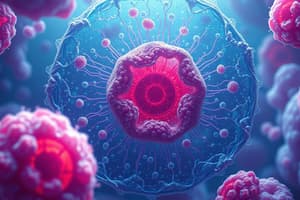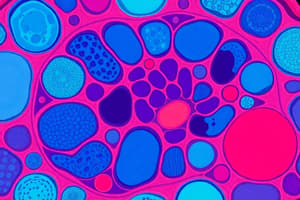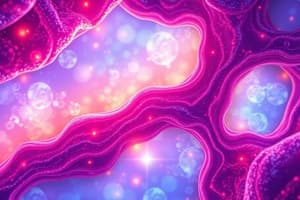Podcast
Questions and Answers
Which type of epithelial tissue is primarily involved in absorption and secretion?
Which type of epithelial tissue is primarily involved in absorption and secretion?
- Simple Columnar Epithelium (correct)
- Stratified Squamous Epithelium
- Pseudostratified Columnar Epithelium
- Simple Squamous Epithelium
Stratified Squamous Epithelium is found only in the respiratory passages.
Stratified Squamous Epithelium is found only in the respiratory passages.
False (B)
What characteristic of epithelial tissue is defined as having a distinct apical and basal surface?
What characteristic of epithelial tissue is defined as having a distinct apical and basal surface?
Polarity
Simple __________ Epithelium consists of a single layer of flat cells and is important for diffusion.
Simple __________ Epithelium consists of a single layer of flat cells and is important for diffusion.
Match the type of epithelial tissue to its primary function:
Match the type of epithelial tissue to its primary function:
What is a common feature of all epithelial tissues?
What is a common feature of all epithelial tissues?
Epithelial tissue is vascular, meaning it contains blood vessels.
Epithelial tissue is vascular, meaning it contains blood vessels.
Name a type of epithelial tissue that is commonly found lining the airways of the respiratory system.
Name a type of epithelial tissue that is commonly found lining the airways of the respiratory system.
Which type of epithelium is primarily responsible for absorption in the intestine?
Which type of epithelium is primarily responsible for absorption in the intestine?
Pseudostratified columnar epithelium contains layers of flat cells that provide a protective barrier.
Pseudostratified columnar epithelium contains layers of flat cells that provide a protective barrier.
What unique feature do simple columnar ciliated epithelia possess?
What unique feature do simple columnar ciliated epithelia possess?
The _____ epithelium allows for stretching in the urinary tract.
The _____ epithelium allows for stretching in the urinary tract.
Where is stratified cuboidal epithelium typically found?
Where is stratified cuboidal epithelium typically found?
Simple squamous epithelium consists of multiple layers of flat cells.
Simple squamous epithelium consists of multiple layers of flat cells.
Which type of epithelium lines blood vessels and is involved in the passive transport of gases or fluids?
Which type of epithelium lines blood vessels and is involved in the passive transport of gases or fluids?
Pseudostratified Columnar Epithelium is characterized by cells that appear to be in multiple layers but are actually a single layer with varying heights.
Pseudostratified Columnar Epithelium is characterized by cells that appear to be in multiple layers but are actually a single layer with varying heights.
What type of epithelium is found lining the upper respiratory tract?
What type of epithelium is found lining the upper respiratory tract?
What is a key characteristic of Stratified Squamous Epithelium?
What is a key characteristic of Stratified Squamous Epithelium?
Simple Cuboidal Epithelium is composed of flattened cells that are irregularly shaped.
Simple Cuboidal Epithelium is composed of flattened cells that are irregularly shaped.
The lining of the gut tube is primarily made up of __________ epithelium.
The lining of the gut tube is primarily made up of __________ epithelium.
Where would you typically find Keratinized Stratified Squamous Epithelium?
Where would you typically find Keratinized Stratified Squamous Epithelium?
Match the type of epithelium with its function or location:
Match the type of epithelium with its function or location:
Name one function of Simple Cuboidal Epithelium.
Name one function of Simple Cuboidal Epithelium.
Match the following types of epithelium with their characteristics:
Match the following types of epithelium with their characteristics:
Flashcards are hidden until you start studying
Study Notes
Epithelium Tissue
- Epithelium is a primary tissue type composed of tightly packed cells with minimal extracellular matrix.
- It's derived from all three germ layers (ectoderm, mesoderm, endoderm).
- All epithelial tissue rests on a basement membrane composed of two layers: basal lamina and reticular lamina.
Functions of Epithelial Tissue
- Protection of underlying tissues from abrasion and injury
- Absorption of molecules into cells
- Diffusion of molecules down their concentration gradients
- Secretion of molecules from cells
Characteristics of Epithelial Tissue
- Polarity: Apical surface (exposed to the outside) differs from the basal surface (attached to the basement membrane).
- Avascular: No blood vessels, but is innervated (has nerves). It receives nutrients from the underlying connective tissue.
- Regeneration: Lost cells are quickly replaced through mitosis.
- Specialized Contacts: Cells are joined by special junctions (e.g., tight junctions, desmosomes, gap junctions) that provide structural integrity and facilitate communication.
Types of Epithelia
- Covering epithelia: Cells are organized in layers to cover external surfaces or line body cavities.
Classification of Covering Epithelia
- Number of Cell Layers:
- Simple epithelium: One layer of cells
- Stratified epithelium: More than one layer of cells
- Cell Shape:
- Squamous: Flattened, irregular cells
- Cuboidal: Cube-shaped cells
- Columnar: Tall, column-shaped cells
- Surface Specializations:
- Cilia: Hair-like projections that move fluids
- Keratin: Tough protein that provides protection
Specific Epithelial Tissues:
Simple Squamous Epithelium
- Consists of flattened, irregularly shaped cells forming a continuous surface.
- Often called pavement epithelium.
- Supports diffusion of gases or fluids.
- Found in capillaries, alveoli of the lungs, lining the pleural, pericardial, and peritoneal cavities.
- Examples: endothelium (lines blood and lymph vessels), mesothelium (lines body cavities).
Stratified Squamous Epithelium
- Multiple layers of cells.
- Basal cells are cuboidal, and surface cells are flattened.
- Adapted for withstanding abrasion.
- Locations: esophagus, vagina, uterine cervix, mouth, pharynx, anal canal.
Keratinized Stratified Squamous Epithelium
- Contains keratin for additional protection.
- Found in the epidermis of the skin.
Simple Cuboidal Epithelium
- Cells appear square or polygonal in surface view.
- Nucleus is located in the center of the cell.
- Functions in secretion, absorption, and excretion.
- Locations: small ducts and tubules, collecting tubules of the kidneys, small excretory ducts of glands .
Stratified Cuboidal Epithelium
- Multiple layers of cuboidal cells.
- Found in excretory ducts of salivary and sweat glands.
Simple Columnar Epithelium
- Cells are taller than they are wide.
- Nuclei are elongated and usually near the base of the cell.
- Functions in absorption and secretion
- Locations: lining of the intestine, stomach, gallbladder, uterus.
Simple Columnar Ciliated Epithelium
- Simple columnar epithelium with cilia on the apical surface.
- Cilia propel fluids, such as mucus.
- Location: oviduct.
Pseudostratified Columnar Ciliated Epithelium
- All cells are attached to the basement membrane but appear stratified because nuclei are at different levels.
- Majority of cells are ciliated.
- Functions in moving mucus and debris.
- Location: lining of the upper respiratory tract (respiratory epithelium).
Stratified Columnar Epithelium
- Multiple layers of columnar cells.
- Found in the conjunctiva of the eye, the lobar ducts of salivary glands, and certain parts of the male urethra.
Transitional Epithelium (Urothelium)
- Found only in the urinary tract.
- Allows for stretching and expansion.
- Its appearance varies depending on the distension state:
- In a non-distended state, there are 4 to 5 layers of cells; basal cells are cuboidal, intermediate cells are polygonal, and surface cells are large and round.
- In a distended state, there are 2 to 3 layers of cells; intermediate and surface cells become flattened.
Studying That Suits You
Use AI to generate personalized quizzes and flashcards to suit your learning preferences.




